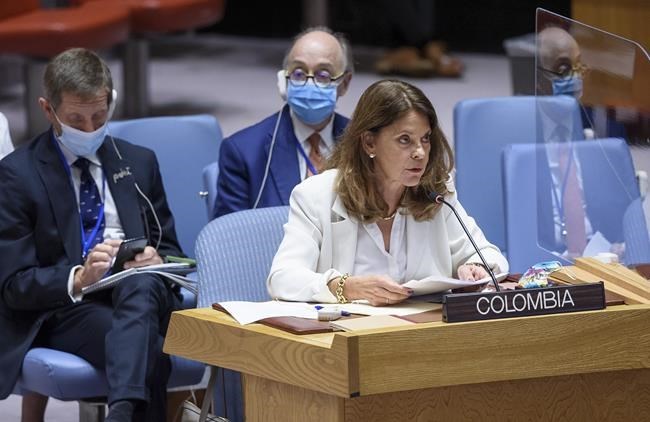Edith M. Lederer

Marta Lucía Ramirez, Vice-President and Minister for Foreign Affairs of the Republic of Colombia, addresses the Security Council meeting on the situation in Colombia, Tuesday, July 13, 2021 at the United Nations. (Loey Felipe/UN Photo via AP)
July 13, 2021 - 4:13 PM
UNITED NATIONS (AP) — The U.N. special envoy for Colombia called on Colombian society Tuesday to use the 2016 peace agreement between the government and the country’s largest rebel group as an opportunity to address many longstanding issues that provoked recent protests and unrest.
Carlos Ruiz Massieu told the U.N. Security Council it is urgent that these issues be resolved, saying “bold steps” are needed to accelerate implementation of the peace deal in the coming months.
“We continue to reject violence from any quarter and urge peaceful dialogue,” he said. “With a new electoral cycle quickly approaching, I invite the parties and all relevant actors to remain committed to the agreement and to continue prioritizing dialogue to resolve their differences.”
The protests started April 28 over proposed tax increases on public services, fuel, wages and pensions, but it has morphed into a general demand for the government to pay longstanding debts to the most vulnerable in society, such as Indigenous and Afro Latino people. Even though the administration of President Iván Duque withdrew the tax measure, protests continued and grew as reports emerged of police violence, deaths and disappearances.
Before the peace deal was signed with the Revolutionary Armed Forces of Colombia movement, known as the FARC, more than 50 years of war in Colombia caused over 220,000 deaths and displaced nearly 6 million people. An amnesty law was adopted covering most offenses committed by FARC fighters.
Ruiz stressed the possibilities that comprehensive implementation of the peace agreement offers “to progressively tackle the root clauses of conflict,” and he invited all parties to persist in fulfilling all of its provisions.
He called recent meetings between representatives of the government and former combatants to jointly assess implementation “a step in the right direction, noting that they were called for by Duque and Rodrigo Londono, president of the Comunes Party formed by the now demobilized FARC.
Ruiz told council members that violence persists against former FARC members, social leaders and communities in the Montes de Maria region, which he recently visited, and other regions, including along the Pacific coast and in parts of the south and northeast of Colombia.
“This is mainly related to the actions of illegal armed groups and criminal organizations who thrive in areas characterized by a limited presence of the state, poverty and illegal economies,” he said.
Ruiz stressed that “the persistent violence and stigmatization against former combatants and members of Comunes Party is particularly concerning, especially ahead of the 2022 elections, when they expect to engage actively in political work across the country.”
Marta Lucia Ramirez, Colombia's vice president and its foreign minister, said that many of the homicides come from narco-trafficking and that “so many” killings of leaders were done by former FARC combatants.
She said a lot of people involved in the business of trafficking coca, cocaine and other narcotics must share responsibility and she urged the international community to work together to identify and eliminate all those who are part of the production, processing in different countries, and distribution.
Ramirez told the council it is important to acknowledge that “progress has been made" in the five years since the peace agreement was signed.
“It's not true that this recent violence that our country has suffered is the result of any breach of the agreement," she said.
Ramirez said the government is “very sorry" for deaths during protests, which she blamed on “minorities" who infiltrate the protests, some armed.
“I want you to know that we have had 15,000 demonstrations, and only in about 11% has there been a need for the national police to intervene," she said.
Ramirez said deploying the armed forces and civil institutions throughout the entire country “is the major overarching priority for the government."
The government believes in peace built by institutions, based on democracy and the division of powers and economic investments to create jobs, “but unfortunately, there are some people who want to get to power by destroying the existing system that we have in Colombia," she said.
In Colombia, the country's human rights ombudsman said Tuesday that at least 44,000 people were forced to flee their homes in the first half of this year because of fighting between armed groups over drug trafficking routes and other illegal businesses in remote pockets of the countryside. That compared to 14,000 in the first six months of 2020.
The office said much of the forced displacement is happening in the southwestern department of Narino, where two criminal groups led by former guerrilla fighters are battling over the control of drug trafficking routes.
___
Associated Press writer Manuel Rueda in Bogota, Colombia, contributed to this report.
News from © The Associated Press, 2021